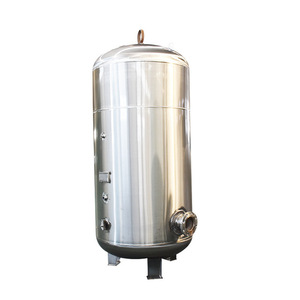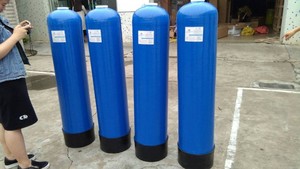(106960 products available)



































































































































































































A 1000L vessel comes in many different types. Some of them are as follows:
1. Pressure vessels
A pressure vessel is a large container built to withstand high-pressure liquids or gases. High carbon steel and stainless steel are the two most common materials used in the construction of 1000-liter pressure vessels. They are both ideal for handling robust and corrosive substances. There are two ways to make a pressure vessel. One is to use the welded method, and the other is to use the bolted method.
2. Bioreactors
A bioreactor vessel provides the optimal growth conditions for living cells and microorganisms to proliferate and perform desired biochemical reactions. Materials, such as glass, stainless steel, and single-use plastic, are appropriate for the construction of 1000L bioreactor vessels. These vessels are ideal for the food and beverage industry. Users usually control their temperature, pH, and oxygen levels.
3. Fermentation vessels
They are specialized reactors designed to support fermentation processes. Compared with bioreactor vessels, fermentation vessels are more focused on microbial growth and metabolite production. They may also have controlled sterility, agitations, and specific nutrient provision requirements. All these features enable the successful scale-up of fermentation processes.
4. Storage vessels
When it comes to industrial operations, the 1000L storage vessel is a large vertical or horizontal tank that is usually made of plastics, carbon steel, or stainless steel. The Food and Drug Administration (FDA) oversees the use of stainless steel as materials for food storage tanks, which usually come with FDA standards and food-grade certifications. 1000L storage vessels can store chemicals, gases, or liquids, such as water, oil, or chemicals.
The typical specification of 1000L vessels includes the size, weight, temperature, pressure, and volume.
Dimensions:
A standard 1000L vessel shape is a cube, with the measurement of 100×100×100cm. However, the actual dimension may vary depending on the specific requirements.
Weight:
The 1000L vessel weight is about 110kg. But, it may vary from different materials and manufacturing processes.
Temperature:
1000L vessels can withstand many high temperatures. For example, the HDPE 1000L vessel can endure up to around 80 degrees Celsius. Meanwhile, stainless steel can maintain a high temperature of around 300 degrees Celsius. Stainless steel also performs well in extreme low temperatures, withstanding as low as minus 196 degrees Celsius.
Pressure:
The pressure rating of the 1000L vessel may also differ due to the materials and design. For example, the HDPE vessel can sustain a pressure of up to 0.6 MPa. On the other hand, the stainless steel 1000L vessel can endure high pressure up to 1.6 MPa or more, depending on the specifications.
Volume:
Of course, the 1000L is also referred to as a metric volume of 1 ton or 1000kg.
Proper maintenance ensures the 1000L vessel will remain in great condition and provides good service for a long time. Here are some helpful tips and tricks to keep the vessel in tip-top shape.
For any non-chemical 1000L vessel, regular cleaning can prevent the buildup of grime and dirt. Ensure that the cleaning agents used are suitable for the chemical vessel. If not, they could damage the vessel or pose health risks to users.
Check for damages:
This includes cracking, corrosion, or any form of damage. Promptly initiate repairs if any damages are identified. This can avoid any great impact on the vessel's performance.
Pay close attention to the temperature and pressure of the 1000L vessel. Abide by the specific guidelines and ensure it is set within the recommended range. Excessive temperature or pressure can cause great damage and reduce the service life of the vessel.
Seek professional inspection:
It is always good to have professionals inspect the vessel from time to time. They can spot potential issues early and suggest maintenance practices to enhance the vessel's performance.
1000l vessels are used in various industries. Here are some common usage scenarios.
Pharmaceuticals
1000l vessels are used to produce, mix, and store medications and vaccines. In drug manufacturing, the vessel can be used to carry out chemical reactions with appropriate monitoring and control. In the case of scale-up from lab to production, a 1000l lab-scale vessel can be further used as the main vessel for the lab. Anticipated Drug interactions and successful separation techniques used in the smaller-scale vessels are usually transferrable. -In Mixing operations, the vessel can be used to mix ingredients, excipients, and formulations. When storing is required, the vessel is used for short and long-term storage of drugs, drug components, and raw materials.
Food and Beverages
In the Food and Beverage industry, the vessel can be used to brew beer, ferment juices, carry out chemical reactions in food prep, and serve as an effective storage container.
Chemical Processing
These vessels are among the most important processing equipment in the chemical industry. The vessel is used to mix, react, and store chemicals. The chemical may be benign or hazardous. The vessel is usually built with compatible and strong material and is equipped with various instruments for safe chemical processing.
Cosmetics and Personal Care
In Cosmetic and Personal Care, the vessel can be used to mix and formulate creams, lotions, and beauty products.
Energy Production
In Energy Production, the vessel is used for biofuel fermentation, biodiesel processing, and bioreactors for energy-related biological processes.
Selecting the suitable 1000L vessel for an industrial scale application involves assessing various factors.
Firstly, customers must determine their specific needs such as the intended use, required capacity, and desired features. They need to consider what type of process the vessel will be used for and the materials and substances it will contain.
Secondly, customers must evaluate the vessel's design and construction such as its type, pressure rating, temperature rating, and more. Customers need to choose the right vessel based on the operating conditions and other specific requirements.
Thirdly, buyers must consider the feasibility of integration based on the existing setup and processes. This involves evaluating factors such as the required utilities, available space, and more, to ensure that the new vessel will function effectively within the existing system.
Fourthly, buyers need to consider the requirements for regulatory compliance and the necessary standards. They need to ensure that the vessel complies with relevant regulations and standards for safety, quality, and environmental protection.
Fifthly, customers must consider the maintenance and service requirements of the vessel they intend to choose. This ensures that the vessel can be properly maintained and serviced over its lifespan.
Finally, customers need to consider costs such as procurement, installation, operation, maintenance, and potential downtime. These will help buyers to make an informed decision that's consistent with business goals and constraints.
Q: What is the difference between a 1000L pressure vessel and a non-pressure vessel?
A: The main difference between a pressure vessel and a non-pressure vessel is that the former is designed to store liquid or gas at pressure. This will need to use special materials and some safety standards to be compliant. However, non-pressure vessels do not require such standards.
Q: What is the difference between a 1000L stainless steel vessel and a carbon steel vessel?
A: Both materials can provide excellent durability. Yet, stainless steel vessels are more corrosion-resistant, which is more suitable for storing chemicals or products with high purity. Carbon steel vessels perform better in heat conductivity.
Q: What is an API vessel?
A: API stands for American Petroleum Institute. The API vessel is suitable for oil and gas industries, ensuring compliance with the standards.
Q: What are the surface treatment methods of steel vessels?
A: Common surface treatment methods are polishing, sandblasting, and painting.